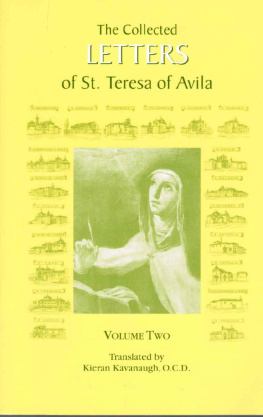
A Month with 
St Teresa of Avila
Edited by Rima Devereaux


Introduction
St Teresa of Avila (151582) was the founder of the Discalced Carmelite Order and a prolific spiritual writer. Born in Avila, Spain, only a few years after Columbuss discovery of the New World and just before Luthers launch of the Protestant Reformation, she entered the Carmelite convent of the Incarnation in Avila as a young woman. She struggled with ill health but eventually felt called to found a new convent that would mark a return to the primitive Carmelite Rule followed by the hermits on Mount Carmel in the Middle Ages. She devoted the rest of her life to founding further convents and collaborated with the mystic St John of the Cross on the foundation of monasteries of friars.
These extracts are taken from her four major works and highlight the core concerns of her spirituality. They include her focus on prayer as friendship with God, her comparison of stages in the spiritual life to four ways of watering a garden, her pithy remarks on the Lords Prayer (the Our Father) and her practical advice on developing the virtues needed for a life of prayer.
Teresa was a passionate woman whose forceful personality and sense of humour emerge from her writings: Visitors to Carmelite monasteries today continue to be startled by the down-to-earthness, naturalness, gaiety and spontaneity that they find there. It is the Carmelites inheritance from this rich and womanly Mother. Amid the challenges and complexities of the era in which she lived and her own busy life, she retained a sense of what it means to follow Jesus:
Understanding her as the kind of theologian she was means understanding what it meant to her to be a contemplative, which, as she saw it, was essentially a matter of the sustained awareness of living within the movement of Gods love into creation through the life and death of Jesus Christ.
Her attractive approach to the spiritual life means that she continues to defy categorization and to speak to us in the twenty-first century.
A Month with
St Teresa of Avila

Morning
Everything in religion was a delight to me; and it is true that now and then I used to sweep the house during those hours of the day which I had formerly spent on my amusements and my dress; and, calling to mind that I was delivered from such follies, I was filled with a new joy that surprised me, nor could I understand whence it came.
Whenever I remember this, there is nothing in the world, however hard it may be, that, if it were proposed to me, I would not undertake without any hesitation whatsoever; for I know now, by experience in many things, that if from the first I resolutely persevere in my purpose, even in this life His Majesty rewards it in a way which he only understands who has tried it.

Evening
So, then, going on from pastime to pastime, from vanity to vanity, from one occasion of sin to another, I began to expose myself exceedingly to the very greatest dangers: my soul was so distracted by many vanities that I was ashamed to draw near to God in an act of such special friendship as that of prayer. As my sins multiplied, I began to lose the pleasure and comfort I had in virtuous things: and that loss contributed to the abandonment of prayer. I see now most clearly, O my Lord, that this comfort departed from me because I had departed from you.

Morning
Let him not regard certain kinds of humility which exist, and of which I mean to speak. Some think it humility not to believe that God is bestowing his gifts upon them. Let us clearly understand this, and that it is perfectly clear God bestows his gifts without any merit whatever on our part; and let us be grateful to His Majesty for them; for if we do not recognize the gifts received at his hands, we shall never be moved to love him. It is a most certain truth, that the richer we see ourselves to be, confessing at the same time our poverty, the greater will be our progress, and the more real our humility.

Evening
A beginner must look upon himself as making a garden, wherein our Lord may take his delight, but in a soil unfruitful and abounding in weeds. His Majesty roots up the weeds and has to plant good herbs. Let us, then, take for granted that this is already done when a soul is determined to give itself to prayer, and has begun the practice of it. We have, then, as good gardeners, by the help of God, to see that the plants grow, to water them carefully, that they may not die but produce blossoms, which shall send forth much fragrance, refreshing to our Lord, so that he may come often for his pleasure into this garden, and delight himself in the midst of these virtues.

Morning
Of those who are beginners in prayer, we may say that they are those who draw the water up out of the well a process which, as I have said, is very laborious; for they must be wearied in keeping the senses recollected, and this is a great labour, because the senses have been hitherto accustomed to distractions. It is necessary for beginners to accustom themselves to disregard what they hear or see, and to put it away from them during the time of prayer; they must be alone, and in withdrawal think over their past life... They must strive to meditate on the life of Christ.

Evening
His Majesty seeks and loves courageous souls; but they must be humble in their ways and have no confidence in themselves. I never saw one of those lag behind on the road; and never a cowardly soul, though aided by humility, make that progress in many years that the former makes in a few. I am astonished at the great things done on this road by encouraging oneself to undertake great things, though we may not have the strength for them at once; the soul takes a flight upwards and ascends high, though, like a little bird whose wings are weak, it grows weary and rests.

Morning
Let us now speak of the second manner of drawing the water... of the mechanism of wheel and buckets whereby the gardener may draw more water with less labour... I apply it to the prayer called the prayer of quiet...
This is a gathering together of the faculties of the soul within itself, in order that it may have the fruition of that contentment in greater sweetness; but the faculties are not lost, neither are they asleep; the will alone is occupied in such a way that, without knowing how it has become a captive, it gives a simple consent to become the prisoner of God.
Next page



















